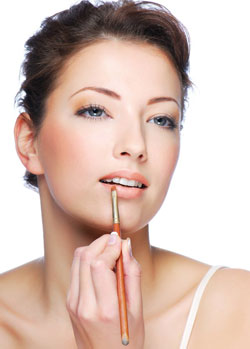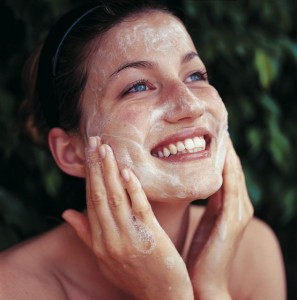Blog
Save Your Skin from Winter Sun Damage
 Winter can be confusing when it comes to proper skin care. Even though we don’t feel the hot summer heat on our skin, the sun’s strong ultraviolet rays can still wreak havoc on our skin year round.
Winter can be confusing when it comes to proper skin care. Even though we don’t feel the hot summer heat on our skin, the sun’s strong ultraviolet rays can still wreak havoc on our skin year round.
This is especially true in regions that receive a lot of snow cover. Harmful UVA rays can reflect off of snow and pass through the glass on our cars or homes – penetrating deep into skin layers and resulting in long-term damage.
How Winter Sun Damage Affects Your Skin
Sun damage has long been associated with the development of skin cancer, and according to the Skin Cancer Foundation, one in five Americans will be diagnosed with skin cancer in their lifetime.
Winter sun exposure is just as harmful as the summer months, which means you should still be lathering on sun protection. Wearing sunscreen on a daily basis is the best way to protect your skin from harmful damage year round.
In addition to skin cancer, sun damage is associated with premature signs of aging. Some early signs of sun damage include:
- Freckles
- Brown spots
- Rough skin
- Broken blood vessels
- Uneven skin tone
- Increase in moles
Ultimately, the amount of premature aging that occurs due to sun damage will depend on your natural skin color and your history of sun damage. Men and women with fair skin and a long history of sun exposure are the most susceptible to early signs of aging.
4 Tips for Protecting Your Skin and Reducing Signs of Aging During the Winter
1) Apply SPF 30 sunscreen to your face and lips every day, even when it’s cold or overcast outside. Also, remember that not all sun screens are created equal. Make sure to purchase sun screen that protects from both UVA and UVB rays.
2) Never use tanning beds. Artificial UVA radiation has long been associated with sun damage and skin cancer. If you want to avoid looking pasty this winter, opt for tanning spray, lotions and bronzers instead.
3) Pay attention to the early signs of sun damage listed above. If you notice anything abnormal, it’s time to schedule an appointment with a dermatologist. Skin cancer is a very treatable condition when caught early.
4) Consider cosmetic treatments for sun damage. If you’re bothered by early signs of aging and sun damage, there are a variety of non-surgical treatments such as laser skin resurfacing, Botox and dermal fillers that can be used to rejuvenate your skin. Winter time is one of the most popular seasons for cosmetic enhancement because patients are more willing to stay indoors and avoid excessive sun exposure.
Quick Tips for Healthy Winter Skin
 Winter can be hard on everyone’s skin. If you’re stressing about upcoming holiday photo-ops, there are few steps you can take to maintain glowing, radiant skin. Just follow our top five tips below:
Winter can be hard on everyone’s skin. If you’re stressing about upcoming holiday photo-ops, there are few steps you can take to maintain glowing, radiant skin. Just follow our top five tips below:
1) Incorporate Plants
Not into your décor, into your diet! Green veggies like kale and spinach provide the necessary nutrients (e.g., protein, minerals and vitamins) to nurture and support skin health. Avoid heavier foods like meat and dairy, which have been shown to cause an inflammatory response in the body, resulting in dull, dry skin.
2) Avoid Excess Caffeine and Alcohol
This can be a difficult one, especially during the holidays, but caffeine and alcohol aren’t good for your skin. Alcohol turns to sugar in the body, and too much sugar can skin cell damage – decreasing skin elasticity and firmness; while caffeine can result in skin inflammation.
3) Rejuvenate with Winter Laser Skin Resurfacing
Laser skin resurfacing can treat a variety of skin imperfections including wrinkles, uneven skin pigmentation, enlarged pores, acne, scars and more. And winter is the best time of year for laser skin resurfacing because your skin is less exposed to direct sun light, which can negatively impact recovery.
4) Avoid Too Much Sodium
A high-sodium diet is one of the main causes of fluid retention, and fluid retention can make your skin look puffy. Cutting sodium intake to 1500 mg a day or less will do wonders for your skin (and your blood pressure).
5) Avoid Spicy Foods
Though spicy foods can be delicious, they can also be terrible for your skin – especially if you have fair, sun damaged skin. Spicy foods can cause your face to appear red and blotchy. They can also aggravate an episode of rosacea.
Image Source: Flickr
3 SURGERY-FREE PROCEDURES TO GET YOU READY FOR THE HOLIDAYS

With everything that we have to do during the holidays – from running around for presents for the kids to preparing the Thanksgiving turkey – it may seem like there is not enough time to refresh your appearance before putting yourself out in front of friends and family at the next big holiday party. With just a few weeks until the holidays begin, a non-surgical procedure is a great way to achieve the look you want without missing out on any of the festivities
Here are three surgery-free facial procedures to consider this holiday season.
Continue reading “3 SURGERY-FREE PROCEDURES TO GET YOU READY FOR THE HOLIDAYS” »
Beauty Products Considered a Necessity, Survey Finds
Beauty products are a necessity, not a luxury, according to About.com’s 2010 Beauty Study, which found that over two-thirds of respondents will still purchase beauty products even while watching their budgets. Eighty percent plan to spend more or the same this year on cosmetic products.
The survey, conducted online in August, investigated how consumers shop for beauty products, what influences their purchase decisions, and what they’re looking for in beauty products.
It revealed that the 1,952 respondents use beauty products for several reasons:
- 69 percent use them to make sure hair and skin stay healthy
- 67 percent use them to help solve specific skin and hair problems
- 59 percent use them to maintain a certain look/style
- 55 percent use them to look the best for their age
Consumers reported that they love products that offer free samples or coupons, but they also said recommendations from friends (55 percent) and experts (43 percent) are factors in motivating them to try new beauty products. Sixty-nine percent of respondents said that celebrities are also a big influence, especially for haircuts and styles.
Over half of participants also showed a preference to well-known brands over generics because they are more reliable and are perceived to have higher value: consumers prefer established brands over generics for cosmetics (73 percent), skin care products (72 percent), and hair care products (67 percent).
The survey found that despite the economic situation, consumers are willing to pay for beauty products if they meet their needs; almost half (47 percent) said price was not a factor if a product solved their beauty problem.
Read more about the 2010 Beauty Study.
Latest Cosmetic Surgery Skin Care Products Reviewed
 Express.co.uk examined whether some of the latest professional-grade skin care products are a substitute for cosmetic surgery procedures and found procedures are more effective and have longer-lasting results.
Express.co.uk examined whether some of the latest professional-grade skin care products are a substitute for cosmetic surgery procedures and found procedures are more effective and have longer-lasting results.
The website had a tester try several cosmetic surgery skin care products for reducing lines and wrinkles, firming skin and plumping lips. The results were not as good or as long-lasting as cosmetic surgery procedures.
For example, a cream that contained peptides to plump lips did instantly add volume. Dr. Michael Prager, a cosmetic surgeon in London, said that while the cream works as a quick fix and hydrates lips, is unlikely to be a long-term solution.
A dermal filler like Restylane, which was recently approved by the FDA for lip augmentation, is your best bet for fuller lips; results last about six months.
After using an anti-aging neck cream that contains a “tensing agent to give an instant lift to saggy skin” for a week, the tester reported that her skin looked smoother and less wrinkly. However, Dr. Prager said it would only work on minor problems and to remove loose skin from the neck, a neck lift is going to give patients the best results.
They also examined a product that claims to be a Botox cream. The tester reported that fine lines filled in and that while her skin felt dry, “the instant results are amazing.”
Dr. Prager believes the cream is filling lines with an ingredient such as collagen and probably has hydrating qualities. For longer-lasting results, Botox injections are the way to go.
Cosmetic surgery procedures produce better and longer-lasting results, but professional skin care products can help you maintain your look between procedures. Talk to your cosmetic surgeon about what products he or she recommends for you.
Anti-Wrinkle Pills Smooth Crow’s Feet

Pills by Lucy Reynell, on Flickr
Anti-wrinkle pills that will soon be available in Europe and Canada appear to be effective at smoothing crow’s feet, according to the New Scientist.
The three-a-day capsules use blends of natural foods extracts that are said to work by activating the genes that improve skin tone.
Independent researchers told the New Scientist that the preliminary results are intriguing, but stressed the need for published results in a peer-reviewed journal.
Created by Unilever in the United Kingdom, the company commissioned four studies to test the pills, and 480 post-menopausal women in Britain, France and Germany participated in the trials.
After 14 weeks of taking the capsules, crow’s feet became 10 percent shallower on average, and wrinkles diminished by 30 percent in those who responded best to the treatment. Furthermore, one study showed that one fifth of those who took the pills had more fresh collagen — a protein that gives skin its tone — in the deepest skin layer compared to those who received a placebo.
Dr. John Casey, who led the team that developed the anti-wrinkle pill, said, “We used ingredients which have been shown in the scientific literature and our own tests to combat the causes of skin aging and kick start old skin cells into behaving like young skin cells.” The pills contain compounds from soya, tomatoes and omega-3 fatty acids and vitamins C and E.
Unilever plans to launch the anti-wrinkle capsules next month in spas in the UK, Spain and Canada. No approval from these countries’ regulatory authorities is needed because the capsules’ extracts are already in use, and the company isn’t claiming that the capsules have health benefits.
How do the anti-wrinkle pills work?
As estrogen production drops in women as they age, collagen is lost more quickly than it can be replaced, resulting in more wrinkly skin. The pills help combat this by boosting the production of collagen, smoothing the skin from the inside out.
Learn more about non-surgical ways to fight wrinkles and the signs of aging.
Caring for Uneven Skin Tone
 Caring for your skin involves a lot of work. A variety of factors such as your overall health, age, hormone level and current skin care regimen can affect the way your skin looks. If you’re like millions of Americans, you’re currently suffering with discoloration or uneven skin tone, which can make you look tired, aged or unhealthy.
Caring for your skin involves a lot of work. A variety of factors such as your overall health, age, hormone level and current skin care regimen can affect the way your skin looks. If you’re like millions of Americans, you’re currently suffering with discoloration or uneven skin tone, which can make you look tired, aged or unhealthy.
Your skin tone (as well as eye and hair color) is determined by varying amounts of a pigment called melanin. People with darker skin tones have more melanin than people with pale skin. Melanin serves as a shield against UV radiation. Uneven skin tone is caused by an uneven build-up of melanin in the outer layers of the skin.
The most common causes of uneven skin tone include:
- Sun exposure – Excessive exposure to UV radiation can result in an overproduction of melanin to protect your skin.
- Natural aging – As we age, our skin’s cellular turnover begins to slow down, resulting in a build-up of dead skin cells. The patches of dead skin cells appear as uneven patches of skin tone.
- Hormonal imbalance – Hormonal changes that occur from pregnancy, hormonal contraceptive or even a thyroid imbalance can lead to melasma (patchy brown discoloration of the skin). This condition usually fades once your hormone levels normalize.
- Skin inflammation – Acne, ingrown hairs, shaving and harsh skin care products can stimulate melanin production.
- Vitamin deficiency – A deficiency in calcium, iron, Vitamin A, E, or B complex can all lead to uneven skin tone.
If you have uneven skin tone, there are several treatment options that can help:
- Exfoliate! – Exfoliation helps remove dead skin cells from the outer layers of your skin. Ideally, you should exfoliate 2-3 times per week.
- Topical creams – Topical vitamin A or Hydroquinone cream (available by prescription) is essentially a bleaching treatment that works by blocking the production of melanin.
- Cosmetic procedures – A variety of in-office procedures such as a IPL photofacial (Intense Pulsed Light therapy) can even out your skin tone.
Learn more about IPL photofacials and other treatments for uneven skin tone.
Adding Obagi Nu-Derm to Injectable Patients’ Regimen Gives Optimal Results
 When patients who had Botox injections also used the Obagi Nu-Derm skin care regimen, they were more satisfied with their results, compared to patients who had a Botox treatment with placebo, Obagi reports. The results also found there was a greater improvement in overall facial appearance among those that used the Obagi products.
When patients who had Botox injections also used the Obagi Nu-Derm skin care regimen, they were more satisfied with their results, compared to patients who had a Botox treatment with placebo, Obagi reports. The results also found there was a greater improvement in overall facial appearance among those that used the Obagi products.
Obagi Nu-Derm works at the cellular level by exfoliating and stimulating cell turnover, so skin “behaves” and looks younger.
Lead researcher Joel Schlessinger, MD, a dermatologist, said that often his patients have skin that doesn’t always look markedly improved with Botox or other injectables alone.
“Many practitioners are not aware of the potential benefits associated with incorporating this system with other non-invasive procedures in the practice,” he said. “This data clearly highlights the fact that by adding Condition & Enhance [Nu-Derm] to injectable patients’ treatment regimen, patients are addressing multiple aspects of aging skin for optimal results. The results prove that, even in patients who have previously had BOTOX, there is room for improvement.”
Patients saw results using Obagi Nu-Derm: 82 percent of study participants had peers notice a positive change in overall facial appearance, compared with 16 percent of study participants in the standard skin care group.
At the end of the 120-day trial, study participants also reported the following:
- 89 percent were either satisfied or extremely satisfied with their overall facial appearance, as compared to 12 percent of the standard skin care group.
- 93 percent were satisfied or extremely satisfied with the treatment regimen, as compared to 12 percent of the standard skin care group.
- All of the participants using the Nu-Derm System wished to continue treatment after the end of the study.
Obagi skin care products, including the Nu-Derm System, are available through Will Surgical Arts.
Common Types of Sun Damage
 Warm sun on your skin is one of the greatest feelings in the world, but unfortunately that feeling often comes with a price – sun damage. Unprotected skin is vulnerable to the sun’s ultraviolet (UV) radiation, which can cause long-term changes to your skin.
Warm sun on your skin is one of the greatest feelings in the world, but unfortunately that feeling often comes with a price – sun damage. Unprotected skin is vulnerable to the sun’s ultraviolet (UV) radiation, which can cause long-term changes to your skin.
Sun damage comes in many forms, but some of the most common types include:
- Dry skin – When exposed to excessive amounts of sun, your skin can slowly lose natural moisture and essential oils. This can cause your skin to appear dry or flaky – resulting in an aged appearance.
- Sunburn – Sunburn is a skin injury that occurs after the skin is exposed to UV radiation. Mild to moderate sunburn results in skin reddening and discomfort, but more severe cases can result in vesicles (fluid-filled bumps) or large blisters.
- Actinic keratosis – When exposed to the sun for a long period of time, small rough patches may develop on your skin. It is possible for actinic keratosis to eventually turn into skin cancer.
- Premature aging – UV damage to your skin can cause structural changes to the collagen beneath your skin, which ultimately results in fine lines and wrinkles.
Repeated unprotected sun exposure can significantly increase your risk of skin cancer. As a general rule, men and women with fair skin and light eyes are at an increased risk. This is due to a lack of melanin in the skin (which shields the skin from UV rays).
Wearing a daily SPF of 30 or greater is the best way to protect your skin from sun damage, but for some of us, the damage has already been done. If you’re unhappy with how sun damage has impacted your appearance, there are a variety of cosmetic treatment options available that can help:
Learn more about laser skin resurfacing and other treatments for sun damage in Urbana.
Botox May be Effective Treatment for Acne According to New Study
 What most people know about Botox is that it treats fine lines and wrinkles. Botox has been an extremely popular anti-aging treatment for over 10 years. However, what most people don’t realize is that indications for Botox stretch far beyond fine lines and wrinkle treatment.
What most people know about Botox is that it treats fine lines and wrinkles. Botox has been an extremely popular anti-aging treatment for over 10 years. However, what most people don’t realize is that indications for Botox stretch far beyond fine lines and wrinkle treatment.
Botox has been approved to treat urinary incontinence (overactive bladder), muscle spasms, excess sweating and more. According to Anil Shah, a plastic surgeon in Chicago, Botox may even be a new treatment for acne.
“Botox definitely clears up acne,” Shah said.
Acne starts when the sebaceous glands (in the skin) produce and release too much sebum (oil) into the pores. The excess oil serves as sustenance for acne-producing bacteria which causes the pores to become inflamed – resulting in acne.
For some of his patients, Shah has been injecting Botox directly into the skin (instead of the muscles between the eyebrows) to prevent the production of sebum.
So far, Shah’s study has only included 20 patients, but the results have been good. After one month, patients experienced an improvement in sebum production and a decrease in overall pore size. Also, patients were happy with the results.
Is Botox right for you?
Shah wants to make it clear though, that Botox as an acne treatment isn’t for everyone.
“I only treat patients over 20-years-old,” he says. “Their hormonal changes are likely permanent. For them Botox is now the safest most effective treatment we have.”
If you’re interested in learning more about Botox as an acne treatment, you should meet with a qualified cosmetic provider or dermatologist who can properly assess your skin care needs.
Source: Medical Daily
 Winter can be confusing when it comes to proper skin care. Even though we don’t feel the hot summer heat on our skin, the sun’s strong ultraviolet rays can still wreak havoc on our skin year round.
Winter can be confusing when it comes to proper skin care. Even though we don’t feel the hot summer heat on our skin, the sun’s strong ultraviolet rays can still wreak havoc on our skin year round.





 When patients who had
When patients who had 










